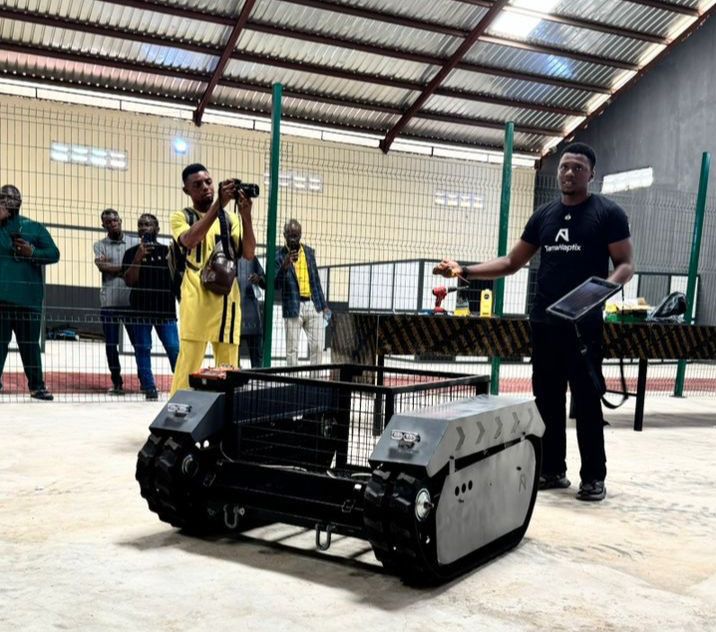In a bold pivot to hardware, 21-year-old Nigerian entrepreneurs Nathan Nwachukwu and Maxwell Maduka are making waves across Africa’s tech landscape. Having previously built software startups that caught investor attention—one even acquired by Nord Motors—the duo is now focusing on drone technology with Terrahaptix, a venture dedicated to reshaping Africa’s hardware sector.
Both founders bring extraordinary backgrounds to this new endeavor. Nwachukwu began his entrepreneurial journey at just 15, pushing forward despite losing an eye early on. By 18, he had launched Klas, an Edtech platform now used by 700,000 people. Maduka, equally driven, served as the lead drone engineer for the Nigerian Navy before founding Spatial Nova, a drone company acquired by Nord Motors in 2022. Now, both are building Terrahaptix, a company blending cutting-edge technology with a passion for Africa’s industrial future.
Hardware innovation is challenging in Africa, with few tech entrepreneurs venturing beyond software. Yet Nwachukwu and Maduka are optimistic, drawing on Nigeria’s small but dedicated community of hardware engineers. Despite Terrahaptix’s young age, the company benefits from the duo’s extensive network, honed over years of entrepreneurial ventures.

Building an African Hardware Hub
For Nwachukwu, Terrahaptix is about more than profit—it’s about uplifting Africa. “I want to see Africa work in my lifetime,” he says, voicing his Pan-African dream to foster the continent’s industrial potential. With Africa’s development still largely reliant on imports, he believes advancing hardware technology can drive meaningful change, bringing an industrialized, self-reliant Africa closer to reality.
Terrahaptix’s ambition is to make Africa a leading global drone manufacturer within five years. But rather than simply building drones to sell, the company takes a B2B approach, securing contracts with major companies that cover production costs. This model, adapted from Silicon Valley defense tech giant Anduril, enables Terrahaptix to sustain itself through contract-based just-in-time manufacturing while using its own funds for research and development. Clients include large corporations in sectors like oil and gas, agriculture, mining, and construction—all with increasing demand for efficient drone technology.
This approach has already proven profitable. Terrahaptix earned $1.6 million in revenue within its first year and anticipates hitting $3 million by year-end. In August, the company signed a $500,000 contract to supply 70 Archer drones to a Ghanaian drone services provider, GEMsolutions. With drones priced 55% lower than European competitors, Terrahaptix is capturing clients eager for high-quality, locally manufactured products at competitive rates.
Going Beyond Hardware: Software and AI Integration
While the focus is on drones, Terrahaptix’s strategy goes beyond hardware alone. Early on, the founders created Artemis, an AI-powered software that acts as a command and control center for Terrahaptix’s drones, enabling autonomous navigation and making the drones even more attractive to clients. With an annual subscription model, Artemis ensures a recurring revenue stream that complements their hardware sales.
Navigating Geopolitical Tensions
Despite strong momentum, Terrahaptix faces significant geopolitical hurdles. The complex international landscape surrounding drones has added a new layer of challenge for the company. “Navigating these geopolitical issues is tougher than we anticipated,” says Nwachukwu, referencing the political implications of drones following the Russia-Ukraine conflict. To protect their interests, Terrahaptix has avoided partnerships with the Nigerian military, a decision that aligns with U.S. regulations discouraging foreign military ties for companies backed by U.S. investors.
As a further safeguard, Terrahaptix established a secure, 15,000-square-foot factory in Abuja, ensuring the company’s proprietary technology stays under close guard.
Diverse Product Line and a Vision for Growth
Terrahaptix has developed an impressive product range tailored for African needs:
- Archer Drone: A long-range surveillance drone with up to five hours of flight time and a 200-kilometer range.
- Horizon: A crop-spraying drone with a 30-liter capacity, aiding precision agriculture.
- Duma: A robust ground drone for surveillance, cargo support, and agricultural uses, with a payload capacity of 400 kg.
- Kallon Sentry Tower: An AI-powered surveillance tower that can detect threats within a five-kilometer radius.
Though young, Terrahaptix is steadily advancing towards its goal of capturing a 25% share of Africa’s $4 billion drone market in the next five years. With initial funding of $640,000, the company’s cash flow is already strong enough to support this ambition without needing additional capital.
As Nwachukwu and Maduka continue to make strides, Terrahaptix might just become the hardware startup that helps industrialize Africa, proving that young, determined entrepreneurs can unlock the continent’s potential by tackling its toughest challenges head-on.
































